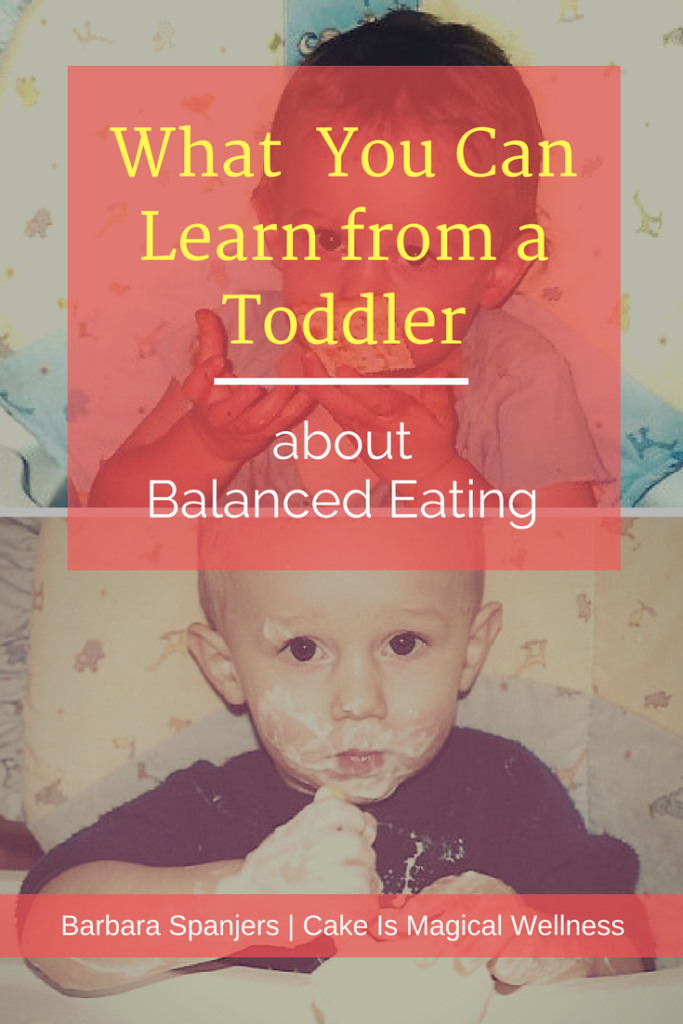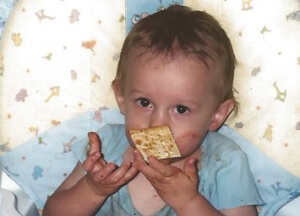Parents often go to great lengths to get their baby or toddler to eat. Some classic attempts:
- Here comes the airplane, open up the hangar.
- Just one more bite. Pretty please?
- Have some “pink chicken” (salmon). Have some “pig chicken” (pork). (Thanks to my friend for that one.)
The problem is that approach doesn’t work.
Very little kids already know how to respond to their internal cues of hunger and satiety. Unfortunately, parents don’t trust that innate ability. It’s one of the reasons moms often get anxious when they breastfeed, wondering if their child is eating enough.
In truth, wee humans have a lot to teach us. Before they get exposed to the Clean Plate Club, the Red-Light Food Posse, the Portion Control Police, and the How Can You Have Any Pudding if You Don’t Eat Your Meat?!* Crew, very young children regulate their own eating.
It just doesn’t look like what adults think is proper.

If you’ve spent much time around toddlers, their eating looks something like this:
- Monday: Eat everything served at dinner. Everything. Ask for more broccoli.
- Tuesday: Refuse everything served at dinner. Everything. Especially broccoli.
- Wednesday: Only eat white food.
- Thursday: Live on air.
- Friday: Choose lots of different foods, but only eat them if they don’t touch each other.
It may seem like you live with a cute but irrational dictator, yet in the big picture, toddlers eat in a balanced way.
Take-home message: listen to your Littles. Let them guide their own eating. And let them teach you how to guide your own eating. Here are four questions toddlers seem to ask themselves. It would benefit us adults to do the same.
[Tweet “We don’t need to teach toddlers how to eat. They can teach us.”]
Am I hungry?
Sometimes mealtime doesn’t correspond to our stomachs. Very young children are less influenced by external cues like clock-time, but notice their own internal cues of hunger.
Adults can use The Hunger Scale. Think of a range from 1-10 where 1 = famished /practically fainting from hunger and 10 = so stuffed that you feel sick. Check in with yourself. Eating when you’re around a level 3 will get you more in tune with your own internal signals.
Do I like it?
Regardless of what the latest research says about what foods pack the biggest nutritional punch, it is important to eat foods you like. (No, that does not mean I’m telling you to eat French fries 24/7.) You’ll enjoy your meal more, and you’ll be less likely to go grazing for food after mealtime is over.
Also, as toddler-whims demonstrate, our appetites for specific foods can change day-to-day. Honor that.
Do I feel satisfied?
Eat foods you enjoy when you’re in the mood for them. Satisfaction is about eating a large enough quantity of food, but it’s also important to eat foods that you like. Food is fuel, but we cannot strip all emotional and cultural meaning from it. If you eat purely from nutritional rules, you’ll likely feel unsatisfied at mealtime. This actually spurs you to keep looking for food.
Regarding quantity – how do you know if you’ve eaten enough? Refer again to The Hunger Scale where 1 = famished /practically fainting from hunger and 10 = so stuffed that you feel sick. Stopping your meal when you are around a 7 means you’ll feel satisfied physically.
And if you get hungry again? The world won’t end – have a snack.
Do I have better things to do?
You may have a hard time getting little ones to stay with you at the dinner table. As soon as they’ve had enough food – bam! – they’re off again to create mayhem around the house. Toddlers have a remarkable ability to eat and then turn their attention to bigger priorities, like dressing up the dog.
Unfortunately, adults often carry food preoccupation with them throughout the day. Some of this arises from a) not eating enough and b) judging foods as “good” or “bad.” If you don’t eat a large enough quantity of food, your body will work hard to get your attention, asking for nourishment. Taking power away from trigger foods like pasta, chips, or ice cream lets you get that out of your head so you can focus on other things.
*Thanks to Pink Floyd.
Suggested article
Orrell-Valente, J.K. et al. (2007). “Just three more bites”: an observational analysis of parents’ socialization of children’s eating at mealtime. Appetite, 48(1), 37-45.






